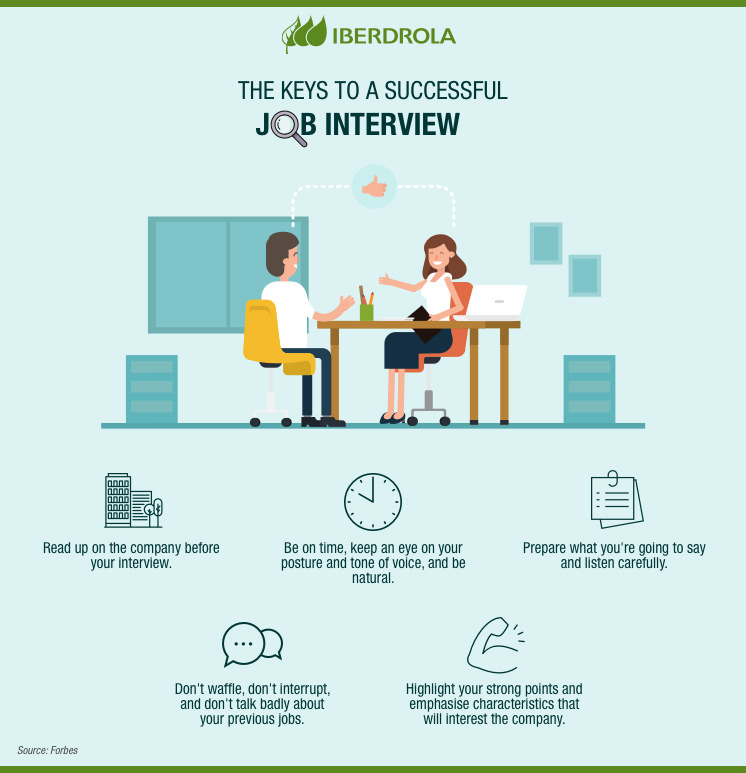How to prepare for a job interview
The best advice for before, during and after a job interview
Employment Professional skills
Heavy demand for jobs, as well as new recruitment techniques, can make looking for a job a real obstacle course. In this article, we bring you a series of tips to succeed at a job interview. The key thing is not to fall prey to common pitfalls and to pay particular attention to non-verbal language.

Today's job market is complex and is evolving at breakneck speed. What's more, there's a lot of competition. For one job, there can be hundreds or even thousands of applicants with the correct skills — continuous learning is essential nowadays — and the right attitude. In this regard, job interviews are a key moment to set yourself apart from the crowd and get the role you want. Knowing how to act, what to say and how to do it can make the difference between "when can you start?" and "we'll be in touch".
What companies are looking for, and new recruitment techniques
From specialists in ethical hacking to reinforce cybersecurity, experts on Artificial Intelligence (AI), Big Data or Internet of Things (IoT). Or professionals related to green jobs — solar panel installers, environmental scientists, recycling plant technicians, and so on — all will be fundamental in the fight against climate change. These professions of the future complement more traditional ones like law, architecture or journalism. The interview is a filter common to all of them, so it is important to be well prepared.
No two job interviews are the same. However, there are some questions that are practically guaranteed to show up. For example, questions related to your personality: tell me about yourself, tell me about a situation in which you successfully resolved a problem, define yourself in five words, etc. Or those related to training: why did you decide to study what you did, what would you do differently if you could start again, are you going to continue training, etc. It's also usual to get questions about your previous jobs such as: describe the best boss you've had, how did you get your last job, what did you learn in your last role, etc. And of course, questions about the job you're applying for: what do you know about us, what attracts you to this position, what makes you think you would be good at this role, etc. These questions are about you, and the best thing to do is answer honestly.
What talent managers are looking for is to detect candidates that best match the needs of the role and of the company. To face this challenge, more and more companies are using technologies like Big Data to analyse candidates' skills and competencies. According to Randstad's Talent Trends 2023 report, 53% of companies are concerned about the shortage of talent they encounter to fill vacancies. With this in mind, companies need to be more attractive to the worker, while the worker has a chance to progress faster in the business world.
Job interview tips

SEE INFOGRAPHIC: Tips for a successful job interview [PDF] External link, opens in new window.
According to Forbes magazine, which focuses on the financial and business world, there are several basic premises when it comes to succeeding at a job interview. These can be structured into before, during and after:
Before your interview
The period before the interview is essential to demonstrate confidence during it. What should you be working on? We explain below.
Read up on the company — its history, core business, current situation, etc. —.
Update your CV and look over it to make sure no questions catch you out.
List your strong and weak points and be prepared to explain them.
Pay attention to your physical appearance: first impressions count!
Prepare some brief responses to questions you might be asked.
Prepare an elevator pitch to persuade and make an impression on the interviewer.
Arrive on time ideally — about 10 minutes early —.
During your interview
The main question during is: what's the best way to act on the interview? It is fundamental to give a good impression, in the broadest sense of the word. We suggest following these tips:
Walk in confidently — but not arrogantly — shake the interviewer's hand and be friendly but formal.
Be natural and pay attention to non-verbal communication — don't put your elbows on the table, don't cross your arms, sit up straight, and so on —.
Show enthusiasm and interest, listen carefully, take your time when answering questions, look the interviewer in the eyes — without being intimidating — and don't interrupt.
Don't cast aspersions on people or companies you have worked with in the past — focus on what you have learned — from the experience.
Answer questions clearly and concisely. Don't hesitate, ramble on, or go off on tangents.
Don't lie. If there's something you don't have a lot of experience in, turn it into a positive by talking about how keen you are to learn.
Don't ask about the salary or holidays. Before leaving, make sure you thank the interviewer for the opportunity.
After your interview
Afterwards, analyse the results, look at what went well and what went badly, learn from any mistakes and cross your fingers.




